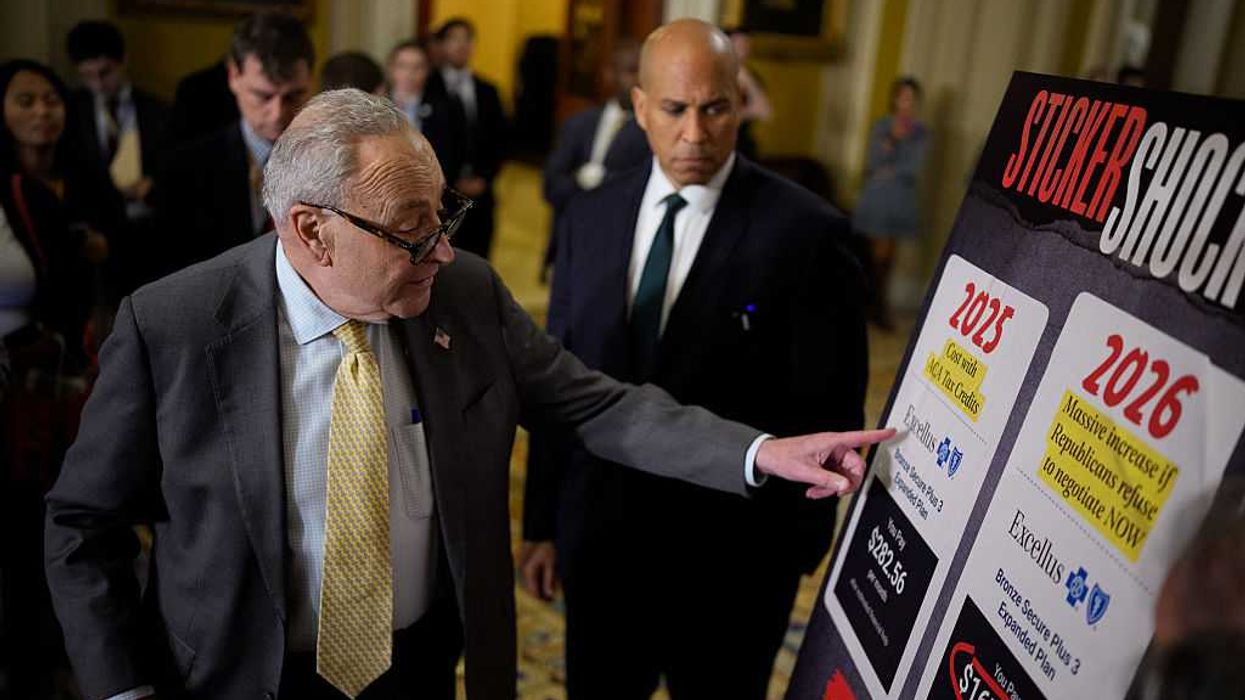
© 2025 Blaze Media LLC. All rights reserved.
"...Iran continues to enrich uranium..."
The Obama administration and congressional Republicans on Monday appeared to be hurtling toward yet another high-profile legislative showdown, this time over whether the U.S. should impose additional sanctions against Iran.
On Monday, Secretary of State John Kerry announced in Austria that international negotiators failed to reach a November 24 deadline for an agreement under which Iran would abandon its nuclear program. Instead of hitting the deadline, Kerry announced a seven-month delay in the talks, and said negotiators would reassess if no deal were in place after four months.
The deadline was expected to be missed, but Republican members of the House immediately responded by saying the delay would only give Iran more time to get closer to building a nuclear weapon.
"As these negotiations drag on, Iran continues to enrich uranium, is free to pursue some nuclear-related R&D, and has been handed access to previously frozen assets and an easing of sanctions," said Rep. Mike Rogers (R-Mich.), who chairs the House Intelligence Committee. "At the same time, the United States has received little in return but a promise to keep talking."
Some suggested that Iran will only continue to stall for time, and said the best way to kickstart the talks would be to impose more economic sanctions against that country. House Foreign Affairs Committee Chairman Ed Royce (R-Calif.) said new sanctions could be used to put more pressure on Iran to reach a deal.
"Since the beginning of these negotiations, the administration aggressively opposed congressional attempts to give our negotiators more leverage with added sanctions, to go into force should negotiations fail," Royce said. "We'll never know if that prospect would have made a difference over the past 12 months. But we do know that talks haven't succeeded without more pressure."
Rep. Ileana Ros-Lehtinen (R-Fla.), who chairs the subcommittee on the Middle East and North Africa under Royce, said there is no basis at all for extending the talks, and that Iranian President Hassan Rouhani "never had any intention of reaching an agreement."
"The Obama administration should realize that the Iranians are not serious about these talks and should abandon the negotiations and with the Republicans in control of both the House and Senate, it's time that we roll up our sleeves and get to work to pass new sanctions on the Iranian regime," she said.
Sen. Bob Corker (R-Tenn.), the top Republican on the Senate Foreign Relations Committee, also said some sanctions program should be developed in case no deal is reached.
"With so much riding on these talks for the security of our nation and that of the region, Congress must have the opportunity to weigh in before implementation of any final agreement and begin preparing alternatives, including tougher sanctions, should negotiations fail," he said.
But even as they were announcing the delay, Obama administration officials said they are completely opposed to the idea of new sanctions legislation. Kerry made it clear that the administration wants to terminate the sanctions against Iran in order to finalize an agreement, but said the world "still has serious questions" about Iran's nuclear program that have not been answered.
White House spokesman Josh Earnest said the administration opposes new sanctions because they would be opposed by some of the countries working on the agreement.
"Layering on additional sanctions could leave some of our partners with the impression that the sanctions regime is more punitive in nature than anything else," Earnest said. "That could cause some cracks in that international coordination to appear."
Legislation imposing sanctions against Iran has been very popular over the last few years, among both Republicans and Democrats. Next year, Congress will likely be in an easy position to pass new sanctions, especially with Republican support.
A question posed Monday is whether the Obama administration would veto that legislation. Earnest hinted a veto could happen, since Obama's position hasn't changed on sanctions, but Kerry declined to answer.
"It's way too premature to be starting to talk about veto," he said.
If it comes down to a veto fight, it will be one of a few issues that the two branches of government will be fighting over. Republicans are already thinking about trying to defund Obama's immigration announcement, and may push for new spending cuts once the GOP takes over the Senate — members have also said they would likely attack Obamacare again through legislation.
Want to leave a tip?
We answer to you. Help keep our content free of advertisers and big tech censorship by leaving a tip today.
Want to join the conversation?
Already a subscriber?
more stories
Sign up for the Blaze newsletter
By signing up, you agree to our Privacy Policy and Terms of Use, and agree to receive content that may sometimes include advertisements. You may opt out at any time.
Related Content
© 2025 Blaze Media LLC. All rights reserved.
Get the stories that matter most delivered directly to your inbox.
By signing up, you agree to our Privacy Policy and Terms of Use, and agree to receive content that may sometimes include advertisements. You may opt out at any time.





